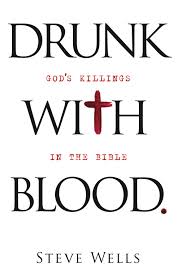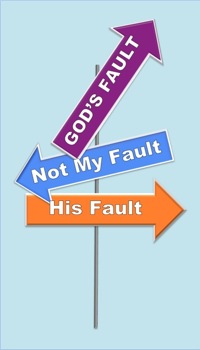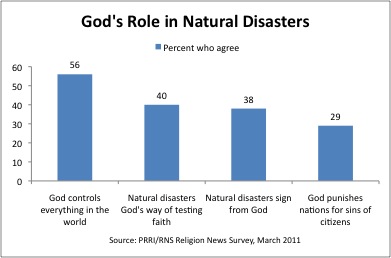 As I continue to write on how to understand the violence of God in the Old Testament, I am always shocked whenever I run into a Christian who thinks the Bible isn’t violent. I want to ask them if they have read anything outside of the New Testament (Even then, you have the book of Revelation and various teachings on hell).
As I continue to write on how to understand the violence of God in the Old Testament, I am always shocked whenever I run into a Christian who thinks the Bible isn’t violent. I want to ask them if they have read anything outside of the New Testament (Even then, you have the book of Revelation and various teachings on hell).
One of the reasons is it is so critical to not only own up to the violence of Scripture, but also to have an answer for it, is because the violence of God in the Bible is one of the main reasons people today are rejecting Christianity and denying the existence of a good and loving God.
So if you happen to be a Christian who doesn’t know the Bible is violent, OR if you happen to think the violence of God in the Bible is “no big deal,” let me invite you to read Drunk With Blood by Steve Wells. If you are a fundamentalist Christian, you will probably be offended at the humorous approach Steve Wells takes in his book, Drunk With Blood, by pointing out all the violence of Scripture, but I think that humor is the only way to write a 300-page book detailing all the violence in the Christian Scriptures. If the book didn’t contain humor, by the time we were done reading about all the killings in the Bible, most of us would want to kill ourselves as well. Without the humor, it’s depressing reading.
As for myself, I thoroughly enjoyed the book. I have read lists of the violence in Scripture before, but never one so detailed, so thorough, and so entertaining.
I personally don’t think Steve was “fair” with all of the biblical accounts of violence, since he often cuts off quotations in mid-sentence, but with all the clear “unfairness” in Scripture where actual human lives are getting “cut off” by God, it’s hard to quibble over minor details like that.
Look, if you want to know how the Bible looks to someone who doesn’t read the Bible through “Christian-colored” glasses, you must read this book. And if you want to know why Christians are often seen as hypocritical and violent, it is because we defend the actions in the Bible as “holy and just” while condemning identical behavior in people of other religions.
As a Christian myself, I believe Drunk With Blood should be mandatory reading for all Christians.
And hey! Bill Maher recommends it too:

Drunk With Blood shows us what we Christians don’t want to admit, that God is violent! The sooner we own up to this fact, the sooner we can start dealing with it honestly, and trying to understand the Old Testament violence of God in light of Jesus Christ dying on the cross.








 When people seek to defend the idea that God is violent “because the Bible says so,” what they are really doing is allowing the violent portrayals of God in the Bible to override and trump the loving and merciful portrayals of God elsewhere in Scripture, even when both portrayals are talking about the same historical event.
When people seek to defend the idea that God is violent “because the Bible says so,” what they are really doing is allowing the violent portrayals of God in the Bible to override and trump the loving and merciful portrayals of God elsewhere in Scripture, even when both portrayals are talking about the same historical event. If a basic rule of hermeneutics is that the simpler and clearer texts should override the more difficult and troubling texts, and if Jesus Christ is the image of the invisible God so that He can say “if you have seen Me, you have seen the Father,” why do we choose to let the more troubling, difficult, and violent texts override and trump the loving, merciful, and Christlike texts?
If a basic rule of hermeneutics is that the simpler and clearer texts should override the more difficult and troubling texts, and if Jesus Christ is the image of the invisible God so that He can say “if you have seen Me, you have seen the Father,” why do we choose to let the more troubling, difficult, and violent texts override and trump the loving, merciful, and Christlike texts? How can a God who says "Love your enemies" (Matthew 5:44) be the same God who instructs His people in the Old Testament to kill their enemies?
How can a God who says "Love your enemies" (Matthew 5:44) be the same God who instructs His people in the Old Testament to kill their enemies?

 We are looking at 4 reasons the Bible is unique. Here is a brief summary of where we have been so far:
We are looking at 4 reasons the Bible is unique. Here is a brief summary of where we have been so far: When we are violent, we make God the scapegoat for our violence. We learned this practice from the father and mother of humanity, Adam and Eve. After they ate the forbidden fruit in the Garden of Eden, Adam blamed Eve, and Eve blamed the serpent, but both inferred blame upon God. In blaming Eve, Adam said “the woman whom You gave to be with me, she gave me of the tree, and I ate” (Gen 3:12). Adam implies that if God had not given the woman to him, Adam never would have sinned. It was God’s fault. Eve’s attempt to blame God is not so obvious, but in blaming the serpent, it seems that she implies that if the serpent had not been in God’s Garden (for didn’t God create all the animals?), or if God had given to Eve the same instructions He had given to Adam (for didn’t God only give His instructions about the forbidden fruit to Adam?) Eve would not have been deceived.
When we are violent, we make God the scapegoat for our violence. We learned this practice from the father and mother of humanity, Adam and Eve. After they ate the forbidden fruit in the Garden of Eden, Adam blamed Eve, and Eve blamed the serpent, but both inferred blame upon God. In blaming Eve, Adam said “the woman whom You gave to be with me, she gave me of the tree, and I ate” (Gen 3:12). Adam implies that if God had not given the woman to him, Adam never would have sinned. It was God’s fault. Eve’s attempt to blame God is not so obvious, but in blaming the serpent, it seems that she implies that if the serpent had not been in God’s Garden (for didn’t God create all the animals?), or if God had given to Eve the same instructions He had given to Adam (for didn’t God only give His instructions about the forbidden fruit to Adam?) Eve would not have been deceived.
